“I Still Love Comics Dearly”: Retailer Patrick Brower on 30 Years of Working in Comic Shops
I’m friendly with a lot of comic shops, but if there was a Mount Rushmore for retailers for me, Patrick Brower – the co-owner of Chicago’s Challengers Comics + Conversation – would definitely be there. He’s one of the great evangelists the medium of comics really has, with the excellent shop he co-owns with W. Dal Bush operating as a perfect place for Chicago residents (and wayward Alaskans ordering from afar) to acquire incredible comics Brower recommends. He knows the world of comics retail in and out, having forgotten more about that world than most of us will ever know. More than that, he’s a remarkably great guy, and someone I’m a huge fan of despite never actually having met him.
So when Brower asked me if I would be interested in chatting with him to celebrate his 30th anniversary of working in comics retail, diving into his personal story of comics and how he went from a regular comic fan to the owner of an Eisner-winning comic book shop, I leapt at the chance. So we recorded an extended conversation about how Patrick got into comics retail, his rapid ascension, comics throughout his 30 years in the field, how he and Dal ended up opening Challengers, how comic shops now compare to when he started, what’s next for comics, and a whole lot more. It’s a heck of a thing, and a wonderful walkthrough of what makes Brower one of the truly great people in the world of comics.
This chat has been edited for clarity and a little for length. Give it a read below, and if you enjoy it, a) make sure to visit/order from Challengers and b) consider subscribing to SKTCHD! This article is open for non-subscribers, but there’s plenty more content you might enjoy if you dug this chat.
Alright, Patrick. We’re going to be talking about your grand anniversary, which will be the day that this publishes. It is your 30th anniversary of working in comics retail. I wanted to begin with a very simple question. When you were first starting in comics retail, presumably at the tender age of six years old, did you think you would be there for 30 years?
Patrick Brower: I didn’t. I can honestly say I didn’t think that, but I also didn’t think I’d be doing anything different. I didn’t think that far at all. I was never supposed to be in comic retail as a career. I graduated college with degrees in illustration and art history. And my plan was to be a freelance artist, an illustrator. I wasn’t foolish enough to think I would be able to do that immediately upon leaving school, but I was going to slowly build a client base and do work. I figured I would need a part time job. I gave myself two weeks after graduation to not look for a job, but I still started working on my resume and printing business cards back in the day and even got some early freelance art gigs.
But I was at our local comic shop, my brother and I had a pull list together. My brother George is six years older than I am and the main reason I’m a comics fan. I was just picking up our books on a Friday and then I got home. I was still living at my parents then because I literally just graduated college two weeks earlier. I got a call from Jamie Graham, the owner of Graham Crackers Comics, where we were getting our books. He said, “What did we ever say about you working here?” And I said, “Nothing?” He said, “Oh, do you want to?” “Yeah. Okay. I need a part time job.” So that phone call was on a Friday. I started the next Monday. I trained at a store. They had two stores at the time. I trained at the Naperville store for a week. At the end of that week, they say, “Alright, we need someone to run our other store. Here are the keys. It’s all yours.”
Wow.
PB: So it was immediately a full time management job. It was a lot of learning on the go. That by the way was 1990. I always remember the date because it was the day that Stevie Ray Vaughan died.
And he died near Chicago. So it’s a very easy thing to remember. It was also the week after Queensrÿche’s “Empire” CD came out, which I listened to a lot and I think I bought it on the first day I worked. So yeah, those two things are how I remember the exact date of August 27th. A week after I started, I had a store.
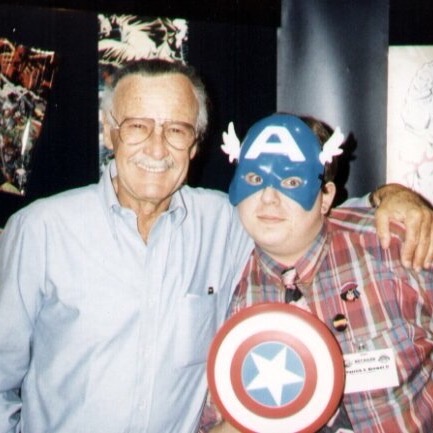
Young Patrick with Stan Lee 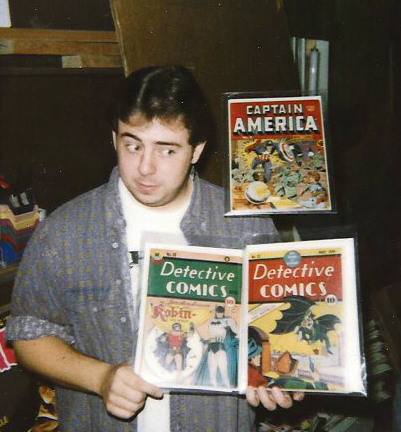
Young Patrick holding some inexpensive old comics
What did you do before then? Did you ever have any interest in comics retail or were you just, I don’t know, taking whatever jobs were available?
PB: I’ve been a comics fan my whole life. My brother was reading comics before I was born, or I guess earlier than me. All my memories have comics in them. Comics have always been around me. So I’ve always been a comics fan. While I never thought about comics retail, when I was asked, I thought I can do this. When I was in high school and college, I worked in video stores. Yeah, I knew customer service and retail and how to handle a cash register and how to talk to people and things like that. So I figured it’d be easy because I don’t need to be trained on the merchandise. I had a lifetime of reading it. So at the time comics retail was so different, David. I mean, I was in a 400 square foot store. And if we did really good for a week, we would do around $1,600. I’m like, “That’s great.” And $1,600 is nothing today.
That’s like 12 Marvel comics.
PB: Yeah. Well, there’s definitely some $9.99 anniversary issues in there.
There we go.
PB: I think I was making $4 an hour when I started. That’s just to give you a snapshot at the time. It’s not that I had any specific goals of being in comics retail, but if I’m doing something, I’m doing something. I give it my full attention or I used to, and I work as hard as I can at it. At the time, Graham Crackers had two stores and then we bought another one and then opened some more. By the time I left, there had been nine or 10. There were 10 or 11 at some point. But I think it was down to, I don’t know, seven, eight or nine by the time I left.
But I mean, I personally helped build all the stores at the time and I don’t have a construction background, but you learned it. You learn how to wire things and install lights and build walls. Literally I think there’s two stores of their, I don’t know, 12 or 13 that they have now that has my actual physical labor still in the stores.
That’s incredible.
PB: But it wasn’t a thing where they said, “Oh, we’ll ask Patrick to do it. He knows how to build a wall.” I mean, I do now.
Right. Because you taught yourself.
PB: Yeah, exactly. It wasn’t a nine to five job. It was, Oh, conventions. Oh, you’re going to travel. Oh, you’re going to go to the Dallas Fantasy fair. You’re going to go to San Diego Comic Con. You’re going to go retailer conventions. You’re going to be behind a table a lot. Things like that. None of that was ever even mentioned when I started. But then it became… For a very long time, it was a weird situation to put that much time and energy and effort into something that wasn’t yours. But it didn’t seem odd to me because that’s just how you did things.
I do think it’s interesting though, because I think it’s fair to say that working at a place for a week or two and then becoming the manager of an entirely different store after having no experience in the comics retail field is probably not the ideal way to do it, but I feel like that type of “I have to figure things out on the run” type start is actually the perfect training you probably needed to eventually own your own comic shop because it was preparing you to have to solve all the problems that might come up with owning a comic shop, except for you just didn’t have the ownership element.
PB: I mean, don’t get me wrong. There’s plenty more things that we had to learn for Challengers, but I think you’re right. And I think that my story is not so dissimilar from the origins of a lot of comic book retailers. I want to point out that even though we’re doing this because it’s my 30th anniversary in comic book retail, I usually make a point of saying full time comic book retail, just in case anybody says, “Oh, I worked in a store when I was in high school or grade school or whatever.” Just to be like, “Oh no, this is as a full time job.” Because I’m a jerk. But I know there’s plenty of people who are still doing it today who’ve been doing it longer than I have and people that have been doing it for their own stores. It’s weird to me how my life parallels Brian Hibbs so much. It’s just that he’s a year older than me.
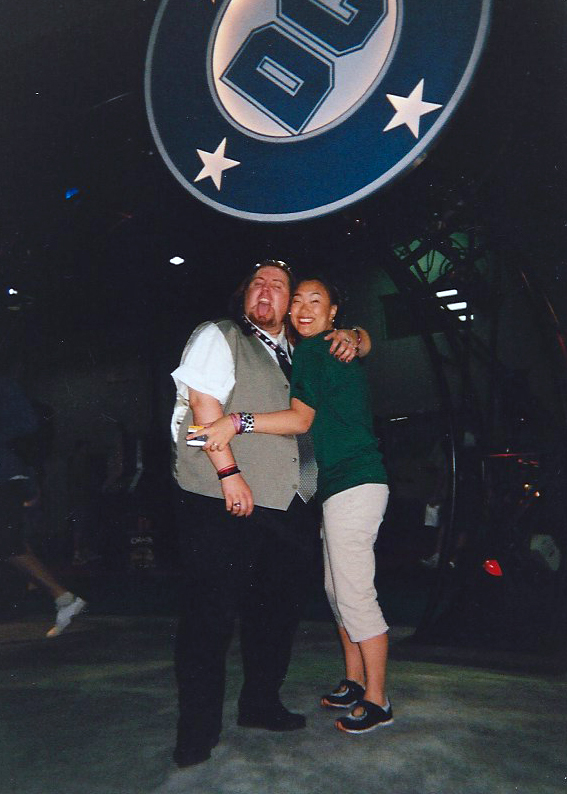
I was going to say, he started in ’89, didn’t he?
PB: Yes. But our stores opened up like a day apart. Our birthdays are super close. We’re just a year apart. I hope I’m not following his path come next year at this time. So he’s a guy who’s doing it for for longer and more for himself, and there’s plenty of people. I’m not even going to try to name people, but look at something like Joe Field who comics weren’t even his first job, but he’s been doing it for forever. But going back to what you said about learning on the run, I think most comic stores kind of open with that. “Oh, I love comics. I want to sell them. Let’s put them all in a room and then figure this out.” My experience wasn’t that much different. It’s just that the room was already there and it was somebody else’s books.
Yeah, exactly. I mean, it was kind of like, that was your for-hire phase and later on, you went to your creator owned.
PB: Yeah, exactly. Yeah.
What were the most important things you learned during that stretch? Because it seemed like, I mean, everything you were doing, you were learning including building walls. What were the most important things you learned during that first stretch in the nineties?
PB: Oh man.
Besides order 8.1 million copies of X-Men #1.
PB: Yeah. And do not repeat that for Warriors of Plasm #1.
Ooh. I don’t know. Time will tell.
PB: Man. Warriors of Plasm was a book that everybody over-ordered, but we especially bet so heavy on it.
I don’t even remember that.
PB: It was Jim Shooter’s company after Valiant.
It sounded Valiant like. I’m not going to lie. I was immediately thinking Valiant. Anyways, most important things.
PB: Patience. Patience because the people that you’re dealing with are very, very excited by the things they’re getting, but may not know how to communicate it. Especially back in the nineties, comics weren’t as mainstream and as widespread as they are now. If you saw someone walking down the street in a Batman t-shirt, they were going to the comic store. Now it’s just a way of life. Like I spent… Gosh. How much was this? I spent $35 on a Batman t-shirt in Marshall Fields back in ’90 or ’91 or actually I think it might’ve been around the first movie, but before I was in comics, because you just couldn’t find them anywhere. 35 bucks in 1989 is a ton of money.
It was like nine hours of work for you.
PB: Yeah, exactly. Just because you don’t find Batman t-shirts anywhere.
No. I mean, when I was kid, if I saw somebody that was wearing anything that was related to comics, I’d be like…kindred spirit. My God. The problem was I lived in Alaska and I never met anyone that had a X-Men shirt or a Batman shirt or anything like that. Didn’t exist.
PB: David, I lived in the suburbs of Chicago and I still only had three friends in high school who I knew who read comics. It’s such a small thing. The fact that we were buying our books at Lyle’s Hobby and Craft, it was a model train store that had two spinner racks of comics. Oh my God, they have comics here. As opposed to the local drug store that had one spinner rack. This was double that. Then my brother was a delivery driver and he happened to drive by a small store in downtown Naperville. He saw Bob Larkin Incredible Hulk poster in a store window. He was like, “What is that store?” So he stopped and that was the first comic store he ever went in. It’s one of the photos I sent you before. “Hey, this is what a comic store used to look like.” With the waterfall rack. Yeah, I’ll send you more pictures. I’ll scan these pictures. But boy, a lot of them were taken very poorly.
The people that would come in were very interested in comics, but not necessarily very good at expressing that or talking to people. And it’s definitely… I think already having been in retail had helped me, but it’s just a matter of letting people be excited. To this day I still get annoyed how some people buy their books, but it’s not my business what people do with their books when they buy them, it’s just let them like them. Let them love them. 1
We did sell gaming back in the day. As a matter of fact, one of the first jobs I ever had to do for the other store was to make inventory tags that we would scotch tape in the back cover of gaming books. So it was sold. We take the tag out and put a little box so we would know how to reorder like, “Oh, these are the RPG’s we sold this week.”
But I remember the rep from whatever gaming distributor we used at the time calling and talking to me about this new thing called Magic the Gathering and explaining that it was a card game and how it would be sold. I remember saying, “You know what? I’ll try two decks.” Not two boxes, two decks. The first person I ever sold a Magic deck to, his name was Dal Bush.
Oh wow.
PB: And he is the co-owner of Challengers.
That’s incredible.
PB: Right. A very, very young Dal Bush.
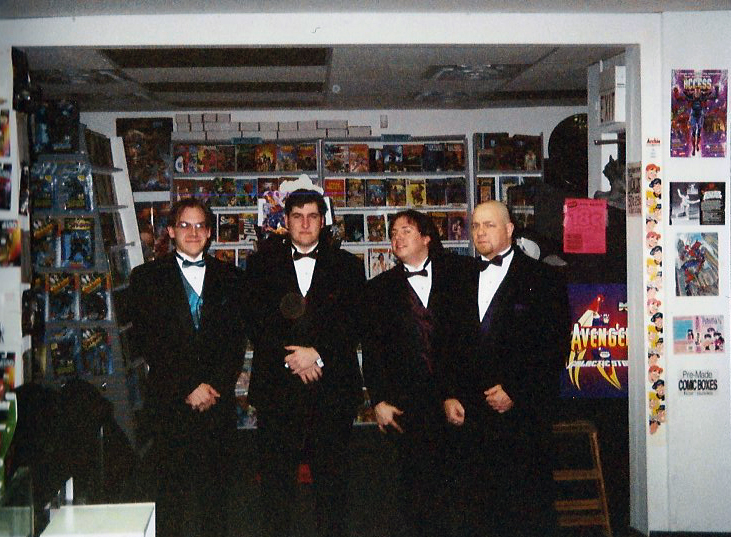
At Graham Crackers in 1997 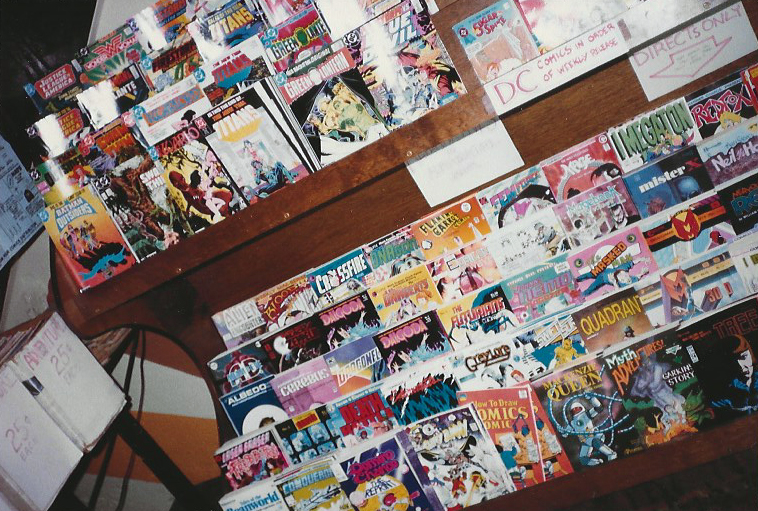
Graham Crackers in 1985 or 1986 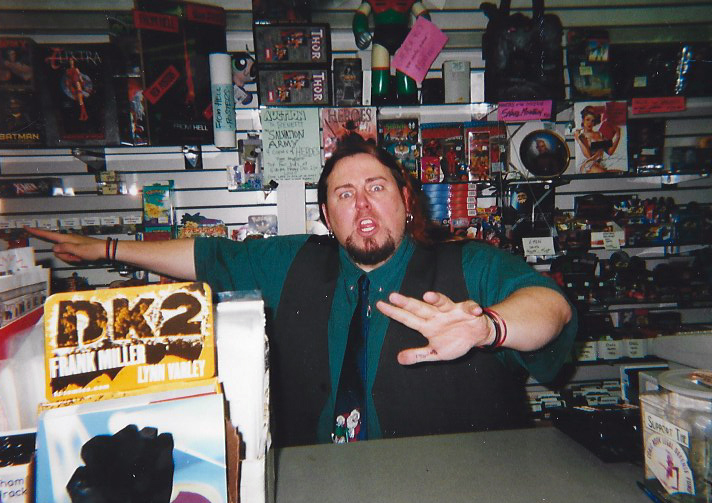
Patrick in 2001 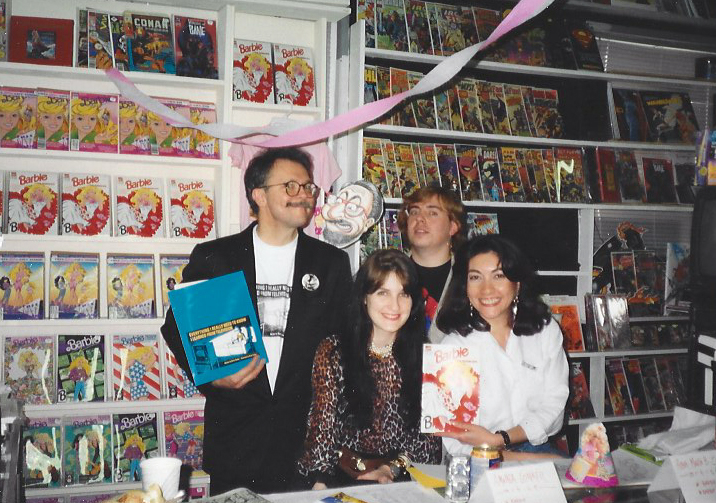
Patrick from 1993 at an event at Graham Crackers Comics
I do want to comment about the video store thing. I know that’s a minor thread, but you really could not have asked for a better job to lead into working at a comic book shop because there’s so much overlap. It’s a very similar experience. A lot of people who come in who are looking for something, but they don’t really know what they’re looking for and also-
PB: Yeah. They either want recommendations or they know it has this artist or this actor, but they can’t remember what it’s called.
Yeah. And the recommendations thing is perfect too. It’s like, “Oh I really like Rushmore, but I also really like Dark City.” And you say, “Oh, well watch this.” Or you come in and you’re like, “Oh, I really like Rob Liefeld’s Captain America and Deathmate Black.” And you say, “I have the comic for you.” That’d be a very interesting combination. Anyways. Before we get to the next section, I told you I was going to have some breaks in here. Here’s a quick challenge for you. Power rank the decades from your experience from a retail standpoint, from the experience of working in retail. The 90s, the 00s and the 2010s.
PB: Well, gosh, I think that it’s only natural to do it in chronological order. It was so different and so new back in the nineties that everybody was learning, so everything was a new experience. But with everything being so new, there were a lot of mistakes made. And obviously I’m going to say that it’s better now because I’m doing it for myself and I’m doing it on my own. I mean with doubt, of course, because Challengers is… I mean, Challengers started in the 00s but really like…
The bulk of it is in the ’10s.
PB: Yeah. It’s been the ’10s. Yeah. So I’m just going to cheat and go in order.
So you’re saying ’10s, ’00s, ’90s. One, two, three?
PB: Yeah.
Was it really weird to learn the ropes for retail during the nineties? Because I mean, the nineties is… I mean, honestly, when you look at it year by year, every year has an insane element to it. I mean, there’s the distributor wars, there’s Marvel going bankrupt, there’s image split. There’s all this different stuff. There’s so many different companies coming up. There’s these books that are selling millions of copies. I mean, I remember hearing a story about the nineties where somebody ordered so many copies of Turok #1, and they didn’t sell them. They had enough copies that they could literally build a chair out of them.
PB: Yeah. I mean, that’s how it was. But because it was so new and sporadic and everything was ever changing, there was never a routine. You never got used to anything because it constantly changed.
It’s got a bit more predictable in a way.
PB: Yeah. It definitely has. And honestly, you can argue now that it’s too complacent and that with something like DC leaving Diamond is such a major industry shake up because it’s been the status quo for so long that we all use just Diamond. When I first started, we were using Capital City and a local distributor called Friendly Franks and Franks would drive their books around. You’d get your books in long boxes every day. Then you can sell those long boxes when you’re done. Apparently Franks obviously long gone. We left Capital City around two years before they went away. We were already leaving them.
But Capital City used to have a warehouse out in the Northern suburbs here close enough that Thursday mornings I would drive to them before work because they had a little bit of a showroom as well as their warehouse. So you could be like, “Oh, Hey, I sold a lot of stuff yesterday. Here’s what we can get.” You can’t do that. You do that online now and hope that Diamond or Lunar or UCS has what you’re looking for that you may have sold out of. But that was immediate. Like, “Oh, we can just pick it up off the shelf and buy it and take it to the store and sell it immediately.”
That’s so wild to even think about. I don’t know why it’s so wild. It just seems insane.
PB: And it wasn’t a major hub, but it was their Chicago branch. There was an employee for Capital City named Byron who I used to be able to do a pretty good impression of. I would call the other stores and pretend to be Byron.
One more power ranking. Now from your personal enjoyment, like quality of comic standpoint, do the same three decades.
PB: Oh, there’s better comics coming out now than ever before. Hands down. Hands down it’s now.
I got a lot of love for the 00s. I’m not going to lie.
PB: Well, you know what? I think we all have a lot of love for our most impactful time. I love Marvel comics in the seventies because that’s the ones that I remember reading the most.
But I grew up in the ’90s though.
PB: Oh, that’s a good point.
The ’90s was my peak time in terms of-
PB: You should be an Image kid.
I should be an Image kid. I mean, I did like Image a lot. I was really big into WildStorm. But the aughts, it was when I got back into comics and I think that’s part of it because I definitely had rose colored glasses when I first came in. But I remember the first comic I bought, single issue comic, when I got back into comics was Infinite Crisis #4. I was completely blown away. It was just Superboy Prime going apeshit and he’s killing everybody. And I’m just like, “This is awesome.” That was when I started buying single issues again. I was reading stuff in trades, but at the same time, I don’t know. The 00s are pretty great for me. The ’10s are definitely better, but maybe it’s just because I was in my twenties in the aughts and everything was bigger emotionally. I don’t know.
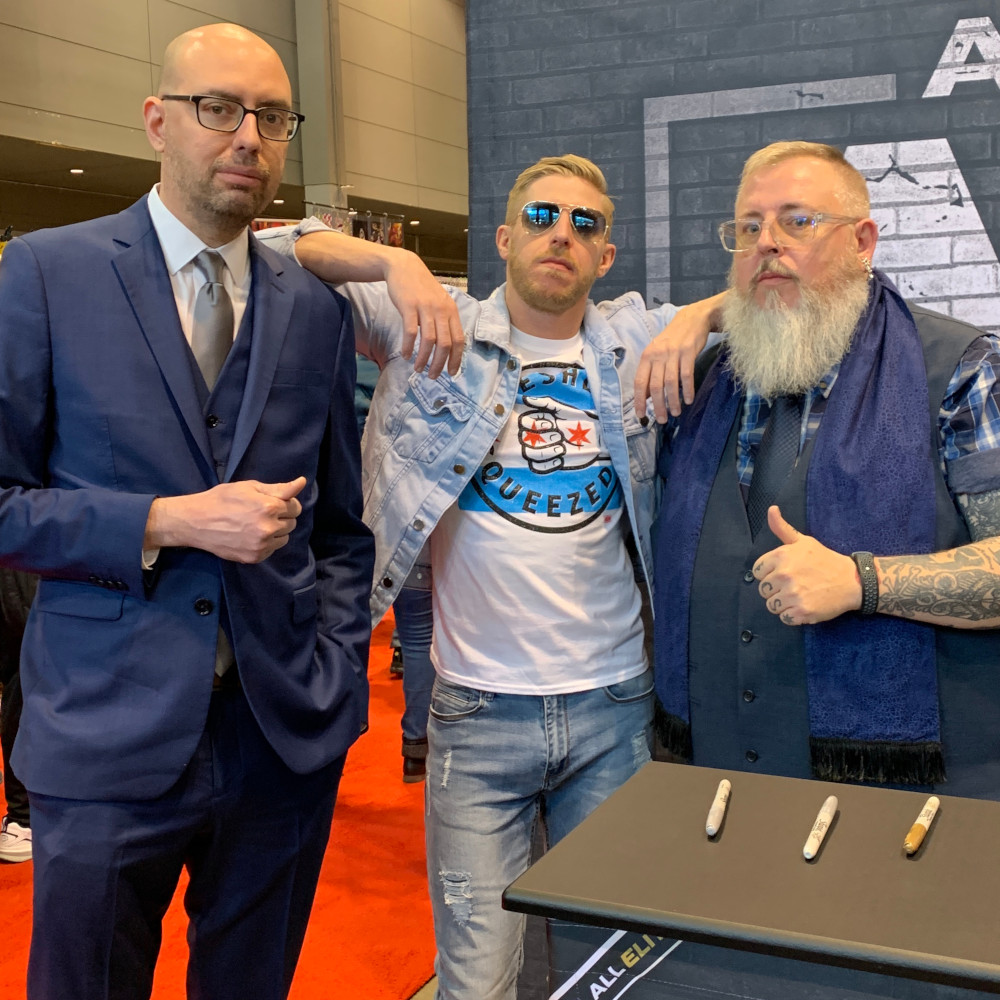
When did you meet Dal Bush? W. Dal Bush, your co-owner of Challengers. Is it when you sold him Magic cards?
PB: Actually it was Marvel trading cards.
Oh, alright. Like the Marvel Universe ones?
PB: Yeah. Dal is 10 years younger than I am. He was going to school at a grade school around the corner from the store. One summer camp day, they took a field trip into town because there was a festival. We used to have street fairs and stuff where I was working at the time. He came into the store and he started buying comics. It was at a point where… This is less than a year that I was working that I since started. And I remember thinking, alright, there’s enough work in the store now that I could use somebody to do menial tasks, like bag and board stuff. Because back issues were such a thing even back then.
It was down between him and another kid who would always come in and buy cards and stuff. And I’m like, “You know what? I think I’ll take a chance on this kid.” I talked to him about possibly working, but I said I got to get your parent’s permission. He says, “Well, my dad passed away. So it’s just my mom.” I’m like, “Alright, let me call and talk to your mom.” Because at the time, David, Dal was 12. So I called his mom and said, “Hey, I’m thinking…” And this was in May of ’91. So I said, “Hey, I’m thinking about having Dal come in one day a week for three hours after school is out in summer, just over the summer to help out around here. Would you be okay with that?” She dropped him off the next day.
I wasn’t planning on him starting for a couple months. He was there then the next day. Obviously he was working three hours a week and then it got to be more and more. At that point, the longer he was with the chain as was I, more and more stores were available. So I left, I moved from Downers Grove to manage Wheaton. And then I was overseeing, I was general manager of the chain. Then we got a store downtown, so I took that one and then Dal was running a Downer’s Grove after I left it. And then he moved over to their Naperville store.
Was that when he was 14?
PB: Yeah, he’d graduated high school. He graduated high school and went full time into comics. He never went to college, which I don’t understand it, because he’s so much smarter than I am. And I have a degree and he does not.
He knew what he liked.
PB: Yeah, yeah. Later in his career, he got a full time office job at night. So he would work in the comic store from 11:00 to 7:00, and then work at Blue Cross Blue Shield from 8:00 PM until 4:00 AM. Then he’d go sleep for a few hours and go back to a comic store. And he was doing that for a while, and then left the comic job.
Man, I slept for seven hours last night. I mean, actual sleep per my Fitbit. I was properly asleep theoretically for eight hours. And I cannot even imagine that little sleep. That would kill me. I’m a metronome when it comes to going to sleep and waking up. Man, I got to say, what a hell of a “what if” moment in your life if you chose that other kid. What would your life be like?
PB: I don’t know because honestly, and I think people already know this, but the idea of Dal and I opening a store was his.
He was out of the game, right?
PB: Yeah. He’d left because the way the other stores were run, they had a habit of making you feel you weren’t doing what they wanted or doing it right. Even though he was working at their flagship store, and it was doing record business at the time. So there were enough incidents where he felt devalued that he said, “I don’t need this. I have another full time job.” And he left.
Then after a month or two away, he just thought, “There’s a better way to do this. I wasn’t bad at that job. There’s a better way to do a store.” And then he called me and said, “Hey, do you want to open a store?” And I just went, “Why? No. I never wanted to own a store.” Because I saw how the other stores run. I didn’t want any part of that. But you can’t not take a chance when one of your best friends says, “Hey, we could do this. We can do this.”
And who wants to live a life of what ifs?
I mean, that is really a hell of a, what if moment though? Because if you chose that other kid who knows. You could be, I don’t know, performing in bars in your band right now or something instead of-
PB: Yeah, right?
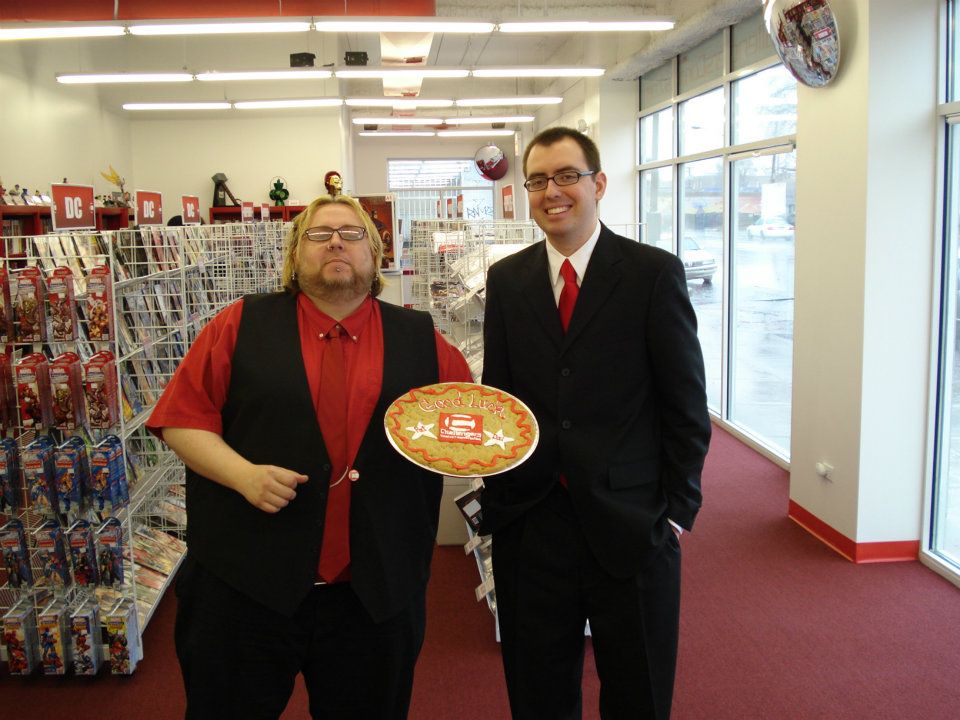
So, that is interesting. So Dal came to you and said, “Do you want to do this?” And you relented, but what was your guys’ vision? Dal clearly had an idea that you guys could do it better. I mean, that’s what he said. When you two were conceptualizing Challengers, what did you learn during that time that made you both realize that there was something, a different way to do this that would maybe work better for both of you, but also for readers?
PB: We would look at stores all the time. We would take visits to stores. And as a comic fan, you yourself, if you’re in a different city, you go to a different comic store, right? You check it out, see what’s going on.
And there was a point where every store looked every store. Every comic stor looked the exact same. Piled floor to ceiling with stuff. So much visual stimulation wherever you look. It was just too much, and a lot of the stores that we worked at were very much a hodgepodge of whatever shelving we can get, whatever material we can get, let’s just throw it all in and make it work.
And we wanted to have a visual aesthetic. We wanted to not use slat wall, which almost every comic store uses is slat wall, the wood with the grooves in it that hooks mount into. We wanted to not look a comic store. Behind our front counter has always just been a wall, where people can draw on it. Behind most comic stores counters are shelves full of dusty old books, that are expensive or hardly ever move. And I don’t want to generalize it, I know there’s people who read this and say, “Not my store.” I mean, not your store, but we wanted to be welcoming. We wanted to have a color scheme, and unified shelving and we wanted to be open and airy and comfortable. And this was 2007 when we started planning, stores weren’t like that back then.
So many stores are like that now, which is great, and the fact that we had a couch and lounge chairs, people had never seen that before and now that is so common. And we weren’t the first to do it. We weren’t the first to do anything, but a lot of people had never seen it before, until they saw it from us. So we’ll get credit for that.
When we opened, we had an art table, people could just sit and use. It was actually Skottie Young’s art table that he gave us when he was moving out of Chicago. And that was just there for anyone just to sit and draw on. We used to have pads out, and we still have all the pads, but the table broke years ago as everything does.
Skottie’s one of those people that, if I may diverge for a minute here.
Go ahead.
PB: I met Skottie Young in the early 2000s, when he was an up and coming artist. And he had a very urban style of artwork, and he was just starting to get work. He used a photo he took of the alley right next to the store I worked at then, was the background for a cover of Human Torch. And I’m Oh my God, that’s right by my store, that’s so great.
But I remember … I have a small laundry list of creators, who I knew that I rallied around and went to editors and said, “You should look at this person’s work. This person is amazing.” And so many of these people are huge stars now, and nobody took a chance when I said it. I went to, to DC for Skottie and said, “Hey, Skottie would be great for Batgirl.” They just had Damion Scott doing Batgirl. And I was told, “We just don’t get his art.”
I took Chris Burnham around at a convention and introduced him to editors and gave them copies of his Indy books and stuff. And then people that turned him down then, wound up using him on … then he worked for Grant Morrison for DC, you know?
I took Jenny Frison around at a convention. Because she was a Chicago person, and she actually came to Chicago and joined the Drink and Draw group that Skottie had. And that was a thing that I used to go to as well. But I took Jenny to editors around … I can’t remember. It was maybe New York Comicon in 2009 or Wizard World Philadelphia.
She was offered work by a publisher, but it was for a rate that was too low. And now she is doing a ton of covers for that very publisher.
So I have all those stories. I used to send books to Chris Staros at Top Shelf, “Hey, here’s some local people I like.” Chris Staros actually, he’s the exception if there was a rule. There was a local creator named Lilli Carré, and I sent her work and a creator named Sarah Beacon. I sent their work to Chris Staros at Top Shelf, and Top Shelf actually published Lilli’s book. Tales of Woodsman Pete. So I got one, one success rate out of other people, and it’s … and who am I? Who am I, that people should listen to what I say? And these editors or publishers shouldn’t have listened to me, Patrick Brower, owner of a comic store. They should have looked at the work and said, “Oh, I can see who this person is, what they’re going to be.”
Yeah. I guess the ultimate point though is, they should’ve listened to you, because you were always right.
PB: And I took a God Hates Astronauts to BOOM! Studios, and gave it to Ross Richie, and he absolutely loved it. And he and Ryan Browne negotiated for a while, but ultimately it was a matter of ownership that didn’t sit well. So that was a maybe. That was an almost.
Yeah. I’m going to give you 1.5, then. 1.5.
I do think, going back to what your guys’ vision for the shop was, I do think it’s interesting. I look back, the first time I ever interviewed you was 2013 and I can remember very specifically why I wanted to interview you. And it was because Robot 6, rest in peace, Robot 6, the best part of CBR for me.
Robot 6 had their AM posts that they would do, and they wrote about you guys opening Sidekicks. Sidekicks, being the all ages section of Challengers. I think it was back in 2013, and it was interesting because at that point, I had been to a ton of shops, but for the most part, they were fairly similar to one another. And I had never heard of one that actually deliberately was focusing an entire section on all ages comics.
And I do think that in some ways, while you might not have been the first, I do think Challengers was visible in a way that others might not have been. And you guys almost kind of started a trend for a certain type of comic shop. But one that’s a comic shop, but it’s also kind of a bookstore and one that’s a little bit more inclusive and thinking towards not just the standard Wednesday Warrior. Do you think that’s fair? Or do you think I’m overstating it?
PB: I do, I mean, you’re giving us a lot of credit. And like I said before, there’s nothing that we did, that someone else didn’t do first, the idea of the comic bookstore goes all the way back to Rory Root and Comics Relief. And when I was first telling Mike Norton about our plans for what Challengers was going to be, he said, “Oh, you mean Isotope?”
Oh yeah. Isotope, too.
PB: And I’d never heard of Isotope before. And we happen to have a lot of similar things, including the color scheme. And I literally had never heard of them, and I look them up and I’m like, “Oh man. We are like Isotope.” Suits, and people get to draw on stuff, and red and white, and parties and alcohol, and things that.
It’s great that we get a lot of credit for that, and the idea of having more than just … we were going to do some chairs, but we had a customer say, “Hey, why don’t you have a couch and stuff, too, in a little designated area?” Yeah, we could do that. Originally we had a lot of ideas that didn’t work.
We wanted to have three windows worth of a projector, a projector beaming onto these windows, 24 hours a day with things like new releases, and store events, and reviews and things. But because we face the West and the setting sun beats on our windows, we actually … And Dal had a new kind of projector that was coming out in Japan that would do all this stuff for us.
And we were seriously looking into doing this, and we were designating the three front for it. But we found out after talking to some tech people, trying to set it up … I mean, before we actually bought the projector, that we would need to build a room, a dark room, and have it extend 11 feet into the store to be able to get the brightness that we wanted for people to see these images on the window, because we’re a block away from a raised train platform. We wanted people to be able to see our windows from the train and from the train platform.
And we just realized, oh my God, that’ll never work. What a fun idea, but it wouldn’t work. And then it’s like, oh, these windows are available. Alright. This is where the couch and the table are going to go. That kind of thing. We wanted to have a webcam streaming all the time, and we did. We started with one, but it wasn’t as grand as we wanted it to be, and also we didn’t realize how boring it would be.
But he wasn’t filming us, it was filming into the store. But in the early days, every day at noon, I would do an air guitar solo.
Just to do something to have something for people to tune in for. But eventually, this was 2008 when we started this, and it kept interfering with signals for our security cameras. So we eventually had to get rid of that camera. So that component of the website is gone. Our website was basically a kind of Facebook, but for comics. You could sign up, get an account, have your own identity, but it had to be your name, David, you couldn’t have a screen name. We had to approve everybody.
And it was for people to post reviews and start chats about things they like. And we did that for a couple years, but then, diminishing returns. Plenty other places on the internet were doing it better. So we just said, let’s just scrap that entirely. I did have Geoff Johns come up to me at a convention and say, “Hey, I heard about what you guys do at your website. I want to join. Can I sign up?” I’m like, “Yeah, absolutely. I’m just give me an email address and I’ll shoot you all the information.” And he did. And I did. And he never signed in. He never joined.
But that’s, I mean, it’s cool to have a creator, especially someone of that stature come up and say, “Oh, I’ve heard about what you’re doing. I want to be part of it.”
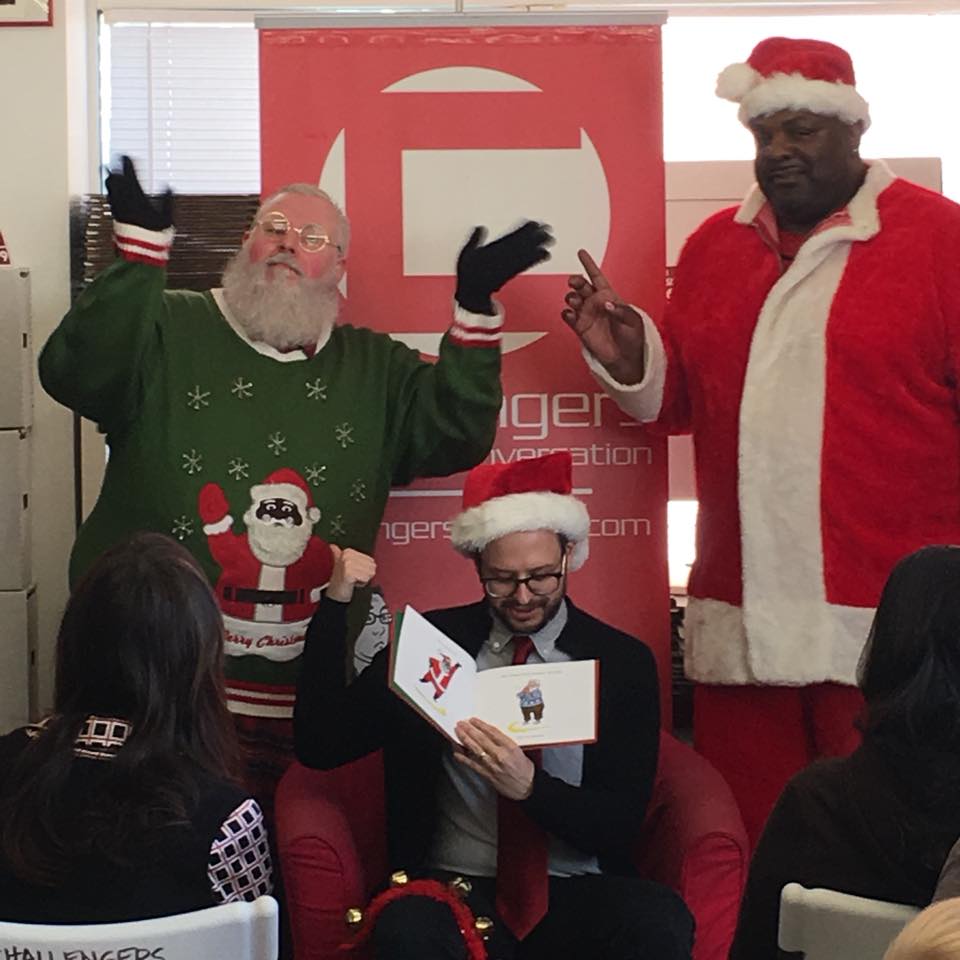
Patrick (l) at a Santa’s Husband signing 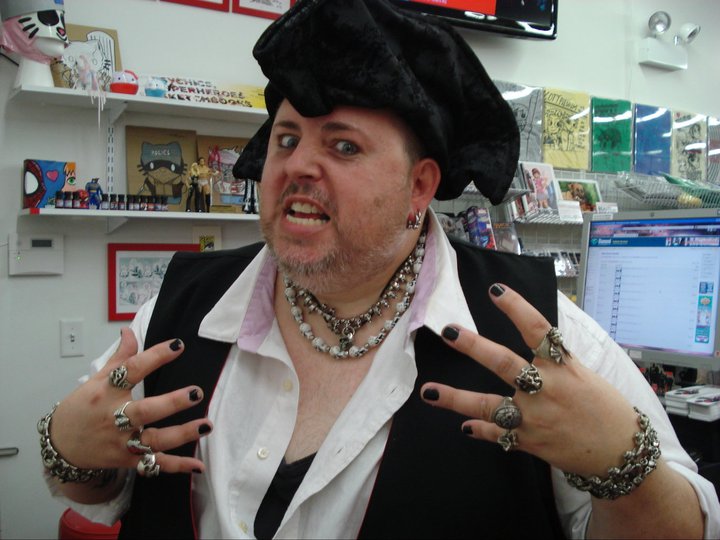
Patrick Brower, in costume 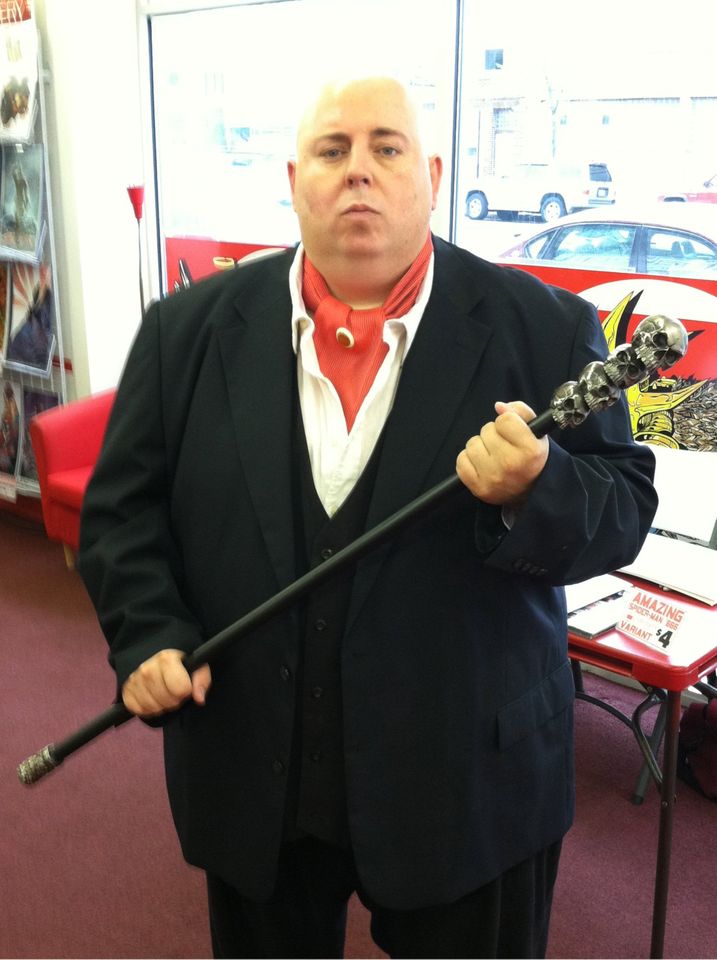
Patrick Brower, the Kingpin
Yeah. That is really cool.
PB: We are also never too proud to kill something. We used to have a graphic novel rental program where people would put pay $5 a month and we’d have a specific section that they could rent graphic novels from kind of thing, like a library. Just check it out, and check it back in. That eventually went away.
We had a bicycle delivery service that we were trying to do to get people from out of our area, people that work downtown Chicago that can’t come here on a lunch break because it’d take too much time. We were going to have bike messengers, go to them. Not enough interest in that, that went away. We used to do our read alongs where we’d get a group of people in, we’d read a book, doing all the voices to a book. We got Jill Thompson to do voices for Magic Trixie. Art Baltazar came in and we did a bunch for Tiny Titans.
Or it was just us, just the store employees doing things Amulet, or Bone, or gosh, there were others. And then we would play it through the store and have a read along. But that stopped working. Jeremy Sorese used to teach art classes for us until he moved away.
I feel those things…you don’t get the things that worked without having the things that didn’t work. You had to try things.
PB: Right. We’re A-okay with things not working. We did a graphic novel club, a book club, but for graphic novels. But you look at what Brian Hibbs was doing with his, and ours was nowhere near that. Hibbs is an example of a national scale, and it’s a point where it’s, “Hey, why should people come to ours when they can just go do his if they want to be part of that.”
But again, the advent of the internet gave people all these other outlets where they didn’t need to do it with us. Everyone knows the story of we’re called Challengers Comics + Conversations, because we wanted to let people know that this is a place where you can talk about the things you like. And you and I were talking before about how growing up, we didn’t have that many friends who were into comics, and this is just a way of saying you do now.
But people don’t need to know that, because they have the internet where you can talk about anything wherever you want and to its detriment, you can find more and more like-minded people all the time.
I do think though that the conversation part is still very prevalent. I went into my shop yesterday, and I was talking comics with one of the guys there that previously worked at Bosco’s. We were talking about Transformers comics and Thor and all kinds of different things. And I do think that that type of stuff is still really … the and conversation part of Challengers…I don’t know if talking on Twitter necessarily replaces that.
PB: Yeah I think people are still talking about it, but they don’t feel like they can’t do it anywhere else anymore.
Yeah. That’s true.
PB: The irony of this is, we recently had a Google review where we got down-starred because “the guys at the store never talk to you, and it feels that they like comics more than people.”
Is it true, Patrick?
PB: I mean, comics don’t judge.
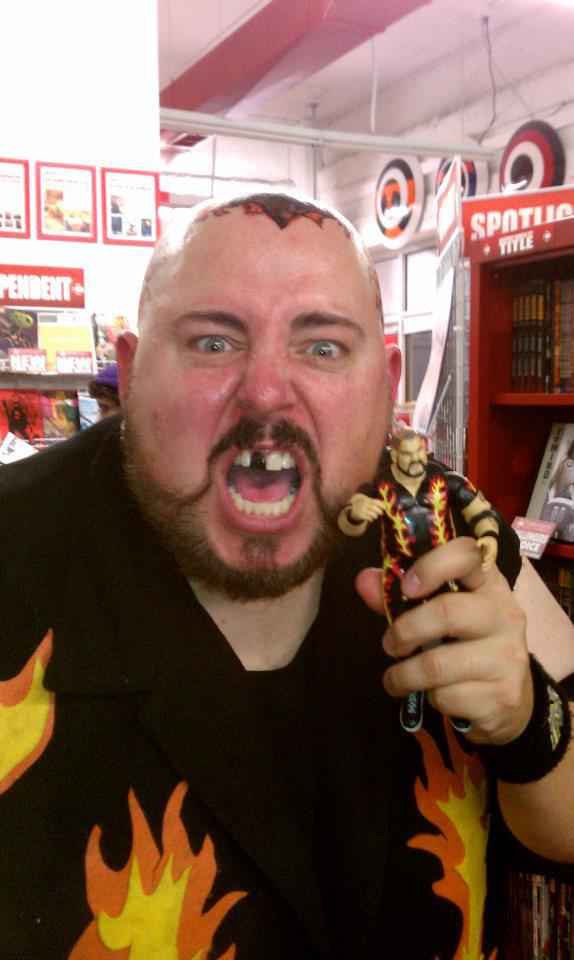
Patrick, in costume 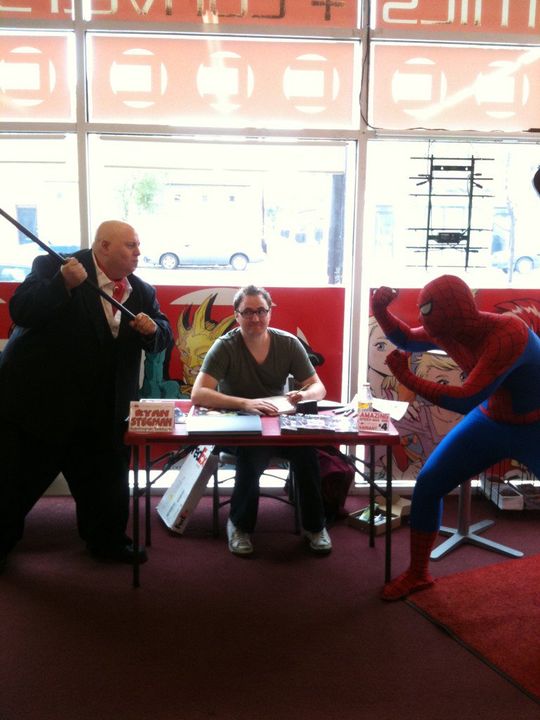
The Kingpin vs. Spidey, with Ryan Stegman in the middle 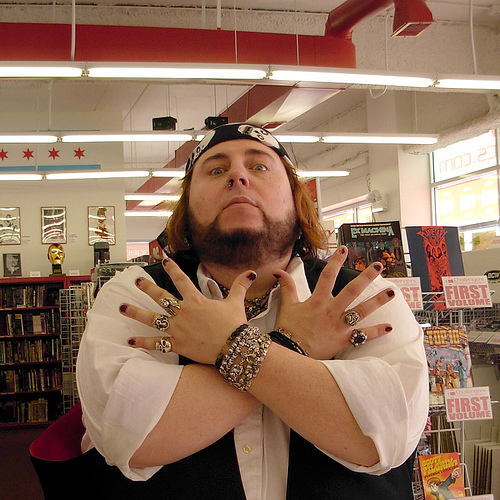
Patrick, in costume
So just a few more questions on this line. Why Challengers as the name?
PB: Oh, that’s easy, because it was a challenge for both of us to upend our lives. I was comfortable where I was, I was making more money than I do now. That is for sure. 12 and a half years later, I’m not making as much as I was when I worked for someone else. But it’s worth in so many other ways. It was a challenge to uproot our lives and to do this, it was a challenge to see if we could make this work, and we challenge our customers, to take a chance on a new store and to listen to us and challenge them to take our recommendations. So it works on a lot of different levels.
Also at the same time, The New Pornographers came out with an album called Challengers of the Unknown. So that was prevalent on Dal’s mind.
That was a good album.
PB: I will tell you the little known second name, if we didn’t go with Challengers, it was going to be Rocketed to Earth.
Yeah. I don’t know if that one would have worked as well for me.
PB: Yeah. Agreed.
Speaking of a challenge, I did want to mention, Chicago is definitely a comic city. There’s tons of creators there. There have been tons of creators there. And it also has a lot of comic shops. How long did it take for you guys to really get a dedicated customer base?
PB: Not that long at all. One of the things we did was, we went to every store in the city and we mapped out where everybody was, and we looked at the areas that were underserved. So when we picked Bucktown, the neighborhood we’re in now, we’ve we felt competent that we weren’t stepping on anybody else’s toes.
We were signing up club members the very first day we opened, which is-
Is that why you call it club? Because you wanted to have people have their space. Is it club instead of pulls because you wanted them to-
PB: No, I think that’s just regional, like soda versus pop.
Because that’s what we always called it. It was called club. When I started at Graham Crackers, it was called Club. It’s a pull list. It’s my box, my folder, my file. Everybody calls it something differently.
We actually call it Your Box at Challengers is the official name of the service. But shorthand, we call it club. There’s a lot of industry shorthand that we use, that just very inside baseball. Orderpak is what we say when we’re going to do the monthly orders, because Graham Crackers used Mel Thompson’s ComTrac program. That’s what it was called.
You’d take the digital order pack and upload it into the system. So it just became, instead of saying doing the orders, “Oh, I’m doing the orderpak now. So to this day we still say orderpak. It’s just a shorthand from what we use it, but saying club was not a specific definition to make it sound like it was more exclusive or anything that. It was just what we always called it.
This is the first time I ever realized that there was any regionality to terms for comic shops. I always thought that was pretty universal. Little did I know. Well, okay, so let’s do another quick split. This might be tough, but if you had to boil it down to one thing or at least the first thing that comes to your mind. What is your favorite memory from the 30 years?
PB: Oh my God. I mean, I have a lot of memories. I don’t know. I mean, good or bad. The death of Superman was one of the worst days I ever had in comics retail.
So we’re going to call that the low point? Because that was also going to come up.
PB: That was the first time we had to deal with what we deal with every day now. With speculators and-
Buying so many polybagged comics.
PB: Yeah. Well specifically that specific day we got boned because the owner of the stores made a deal with a company or a different retailer, I don’t know if it was a store or somebody else, to get hundreds of copies of this book from somewhere in California. So we only had ordered a handful. I think I had 25 copies of that book coming in for the shelf, because we were getting hundreds more from somewhere else.
So we just got our normal capital 25, our standing order kind of thing. And that book blew up, and the people we were getting them from said, “No, we’re not giving them to you.” So we just never had them.
Because it’s the comics industry, and people, they can make way more money. I had people offering me $25 per copy. I’m like, “No, they’re going for normal price. One per person.” I don’t think we had club members there.
And now you can get them for a quarter each. Probably even still polybagged. I remember I had a lot of it still polybag versions when I was doing my comic book garage sale. And I think I might have put one of them out and somebody was like, “How much are you charging for this?” “I don’t know. 50 cents.” They’re like, “Really?” I say, “It is not worth a lot. They did a lot of those comics.”
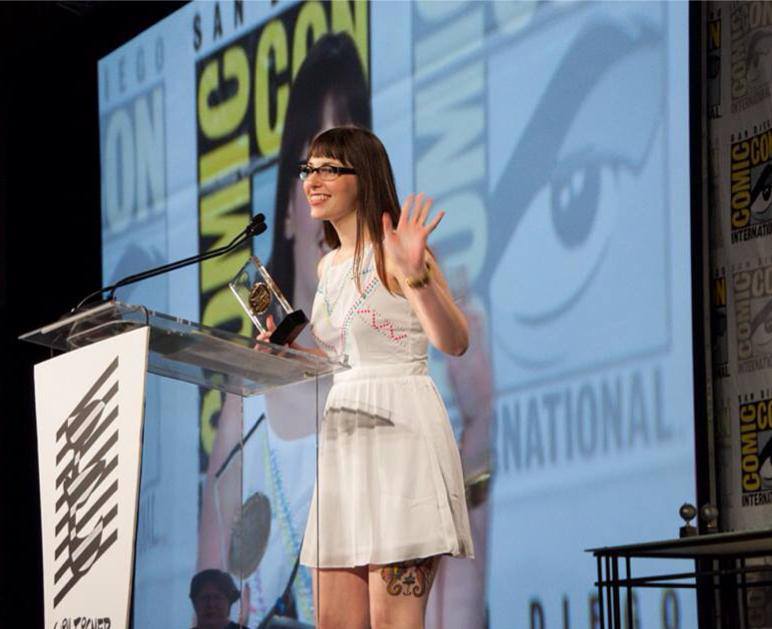
What about a best memory? I figured it would be winning the Eisner or something.
PB: I mean, that’s great, but I wasn’t there for it. I was not in San Diego that year due to personal issues with my parents. We were moving them from the house they lived in for 42 years. We were moving them literally that week. So I could not be in San Diego that time. And we had a representative there. Ashly Challenger was there and she called to say that we won and Skottie Young was the first person to congratulate us online that I was aware of. But Ashly blacked out and doesn’t remember what she said. And for years, I tried to get… because I know they tape things.
They tape these. I tried to get footage and I was told by people in San Diego that because of music rights, they can’t give these tapes out because they play music during the event. Just songs that they don’t have rights to, so they can’t just give the footage out. I’m like, “I’m not going to do anything with it. I just want to see it.”
Years later I found an audio recording. I finally found one years later and it was very brief. Because she was sitting all the way in the back, not at the tables. Have you been to the Eisner’s?
No.
PB: Okay. There’s a stage, a lot of round tables and then behind that is just rows and rows of chairs. And the tables are for the nominees, but retail nominees don’t get the tables so they’re just out in the chairs in the back. So Joe Ferrara from Atlanta Fantasyworld who helps run the retail portion of the Eisner’s, who presents the award every year. So he announces the recipient and it’s Challengers and Ashly was so far in the back that he’s like, “Is anyone here? Oh, wait no there she is. There’s someone’s coming.” Because it took her forever to get to the stage.
That’s hilarious.
PB: I have a lot of great convention memories. I’ve met so many wonderful people. Here’s a great story. I love this story. Joëlle Jones is someone I’d never known, but I loved her artwork. And we had our art gallery before we had the kids room. Before we had Sidekicks, we had the Rogues Gallery. And we were doing an art show with Joëlle for Helheim. And normally if we’re bringing a creator in town for an art show, we’ll take them in for at least an overnight to bring them in, get a meal, do the opening. And then the next morning, take the breakfast or do something. We don’t want to take too much of their time, because we know they’re all busy, but we don’t want it to just be a drive by. We want to make it like worth some time.
Normally if it’s a creator, I try to pull in local creators, to give them more people that they’re maybe comfortable with or people that do what they do. I would have, and this is not name dropping, but it would be like, “Hey, we have Stuart Immonen coming in. Let’s bring Chris Burnham and Jenny Frison and Mike Norton out to have him be with contemporaries.” So you’re not stuck just talking to a retailer kind of thing.
With Joëlle because of the timing, it was just me. And we went right from the airport to Club Lago, which is my favorite restaurant in the city. And it was early afternoon so it was a late lunch kind of thing. So we eat and we drink. The drinking is the key part. And on the way back, I had XM radio at the time and I had the ’70s channel on. Turns out Joëlle is a big fan of ’70s music. So we’re just screaming the lyrics to these songs as we’re driving. And it’s a 20 minute drive from Lago to Challengers. And I’m having a great time, we’re getting along really well.
And we have the opening, we have wine at the opening. We always have wine and cocktails that are openings. Back then it was, we’d have bartenders and make it fancy. And the opening went so well that at the end of it I said like, “Hey, this is the point in the night where normally we just take you back to the hotel and that’s it. But I’m having too much fun. Do you want to still go out? Do you want to get another drink?” She was like, “Yeah, we can get one more drink.” So I was a member of a key club back then, which is a private bar that is, you pay a fee to be part of. Someone has to sponsor you to get in.
And then you have a key. It’s a locked door. You just unlock the door and go in. And it’s a dive bar, but it’s a private bar thing. So we went to the Key Club for several more drinks and then sang ’70s songs all the way back to the hotel. And I wound up recording a cover version of “Billy Don’t be a Hero” for her, because of that night.
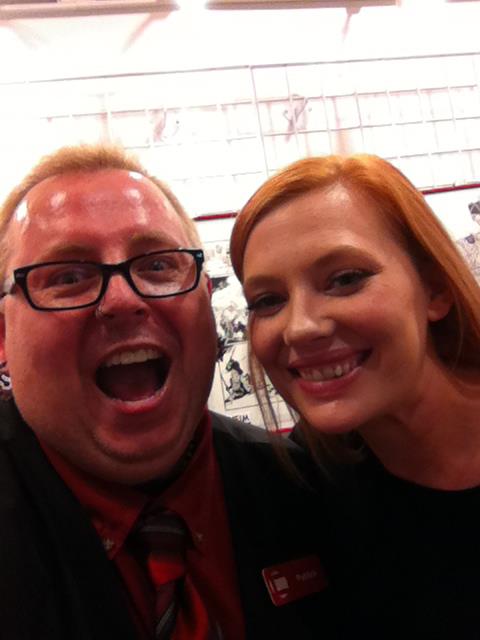
That’s hilarious.
PB: You probably don’t know that song. It’s a terrible song. It’s about a kid who goes off to war and dies and his girlfriend all along had said, “Billy don’t be a hero.”
That does sound like a terrible song.
So, 30 years is a long time to do anything. You’ve went through some serious ups and downs in the comic industry itself. I’m sure that you’ve kind of had times where you loved it sometimes where you hated it, but what makes you keep coming back? What makes you love working in comic retail so much?
PB: The comics. Comics are so good. I wouldn’t still be doing this if I didn’t care about the product. And there’s so many other, not industries, but so many stores or people that approach this as a business, which it is, but also with no affinity for the product.
We have a fully functioning online web store now, that Dal built during the pandemic. So when the inevitable next shutdown happens, we can still stay in business. But we resisted doing anything online for so long, because that is not what we do. What we do is we talk to people about comics.
We read comics, we get excited about comics and then they come back for more. Even so the people that are buying books from us online mostly now, are people that we know and have been to the store and this is just easier for them. So we’re happy to do it. But Stillwater, upcoming from Image. Such a great book. So excited for that book. Got to read #1, love it. I’m going to sell it to everybody I can. To be that excited for comics now… There was a point years ago where I said that when I turned 50, I was going to retire from retail. Not because I could afford to, but because I don’t think a 50 year old man is the person that people should be coming to, to say, “Hey, what’s good, what’s new, what’s exciting, what will I like?”
Because I would think at that point, I wouldn’t look at me as an authority on anything anymore, because I’m going to tell the 17-year-old kid who comes in for comics what’s cool? On paper, it doesn’t sound right. But I didn’t do that because comics kept me because they’re so good.
I think sometimes people who work in comic shops can get a little complacent and might not love the medium quite as much as you. And you have always been enthusiastic. Every time we talk, there’s always something new that you’re enthusiastic about. And if you turn 50 and you’re just like, I mean how am I supposed to recommend something? “I don’t like anything that’s coming out.” That would be one thing.
But you’re still always on top of new things. You’re still always really liking new things. I mean, you sent me Check, Please!, because you met Ngozi Ukazu. And that’s cool, that’s hi[. That’s for young people and you still got it Patrick.
PB: Well, but I mean, again, I can’t take credit for that. That was Faith Erin Hicks telling me, “You have to read Check, Please!”
I’m open to finding new things is I guess the point. I am not as on top of the game as I used to be, but I’ve got some really enthusiastic people around me who I can learn from. And I’m in a text group just with friends. Almost everybody in it has worked in comic retail at some point, but only two of us in it still do it actively. But one of the people in it is very enthusiastic about what he buys and reads. And you cannot help but be inspired by, or pick up on that kind of enthusiasm. And it’s easy to get caught up in the old standbys like, oh, I’m just going to recommend Watchman to anybody who comes in. But you’re not growing your industry by doing that. You’re not growing your store and you’re not helping people find more stuff.
And I always think that I’m woefully behind on the things I need to read. I was given some PDFs of some new books and some I had asked for. There’s a book coming out called Come Home, Indio, which is about an indigenous creator’s identification and growing up, and what does it mean to him to be indigenous and just a coming of age story. And it had been getting some good word of mouth with people I know. And I started recommending it or telling people about it our newsletter. But I’m like, you know what, I actually need to read this first. So I reached out and said, “Hey man, do you have a PDF that I could take a look at and help me with this.”
And I got one back right away still haven’t finished it. A local creator Tyrell Cannon came in with his new book, ERIS just this week. And he’d sent me a PDF of it before it was printed. And now he came in with a printed copy and I never finished it. And I’m bad at staying on top of it, but there’s so much I just want to get to.
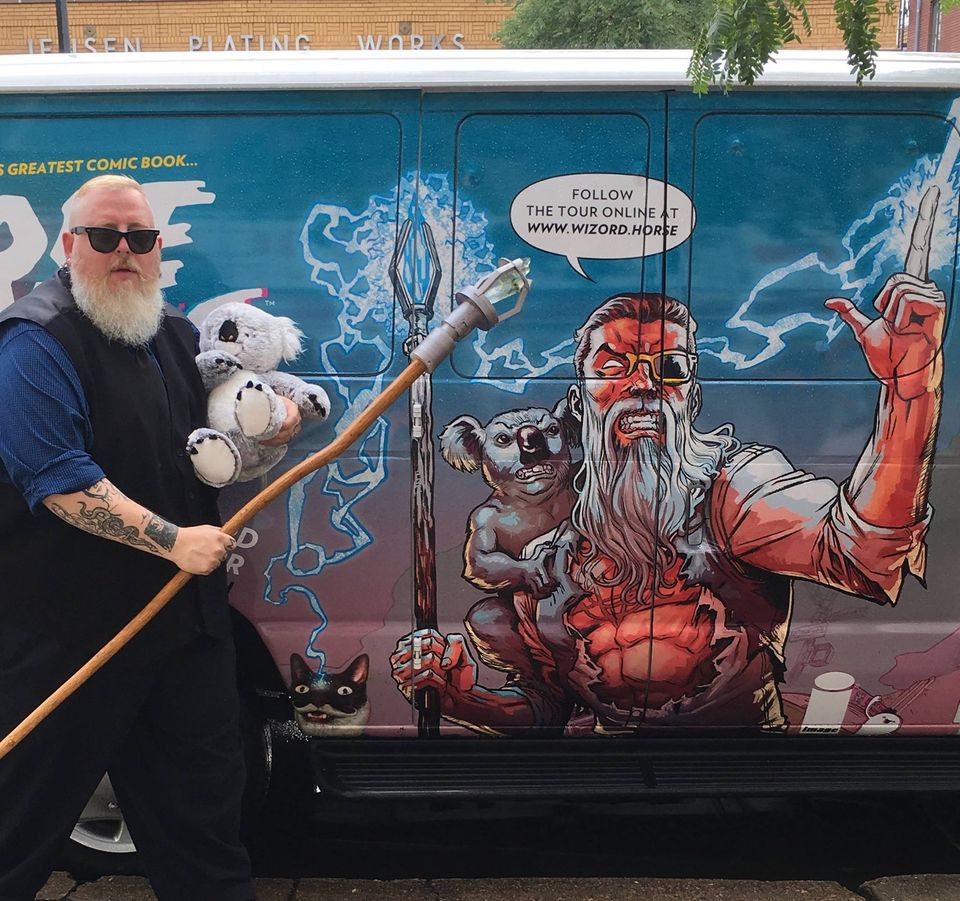
Patrick during the Curse Words van tour 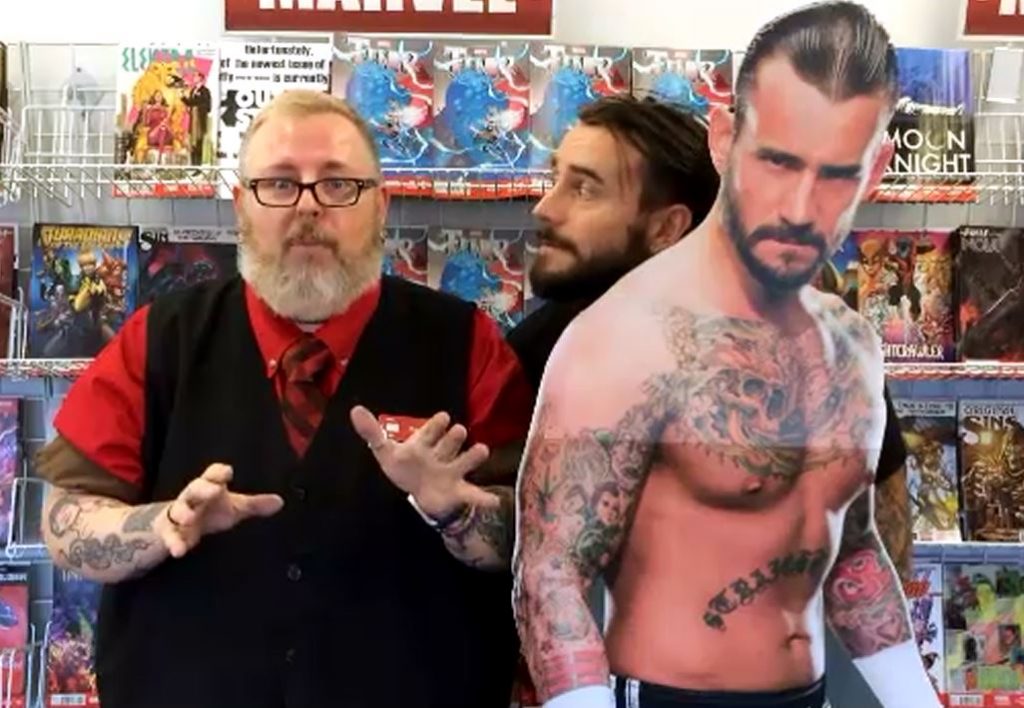
Patrick with CM Punk and CM Punk
Well, this actually kind of reminds me of something. Fittingly my wife is moving around upstairs now, but she works at an architecture firm. And one of the people that’s a partner at her firm, it’s like when you’re kind of at that level, you kind of are doing the overseen stuff. You’re not necessarily doing the drafting work. You’re not doing the drawing and everything like that. And it kind of reminds me…I guess during the first week before you became a manager of an entire shop, you just kind of worked at the shop and you’re able to be enthusiastic about comics and you were probably able to even read comics.
But once you own a shop, there’s the business side of things. There’s ordering, you’re doing your orderpaks. And there’s marketing and there’s doing your Instagram Lives and there’s doing this and there’s doing that. And it’s maybe to a certain degree, once you start owning a shop, it’s a little bit more difficult to continue to build on that enthusiasm. But it also never really seems like you’ve lost it either. You want to follow this stuff. I mean, here’s another thing that’s changed since 1990: there are a lot more comics than there used to be.
PB: There sure are.
I mean, no one can keep up with all of them.
PB: No, it’s hard to, but I think that one of the things in my favor is that I still try to. It also helps that I have a business partner who reads as much as I do. So I could cheat and say, “Hey, what’s this about?” Or “What did you think of this?” And I can use that to talk to people about it as well. So that helps a little bit.
I’ve told you this before, but the comic I most associate with Challengers is The Sixth Gun. And it’s because you guys were so successful at hand-selling that book. And I don’t think you can have proper hand-selling without enthusiasm. And I think you can look at your top 100 most sold books for any given year and be like oh this is a book that either Dal or Patrick loved or somebody else on the staff. I think that’s important.
PB: I think so too. And we like to look toward the end of the year to think, alright, what can we hype this Christmas? What’s going to be big for this year. And even some years, it’s like, oh we don’t have a grand slam book for this Christmas season. But I can tell you this year we will. We’ll have Wonder Woman: Dead Earth.
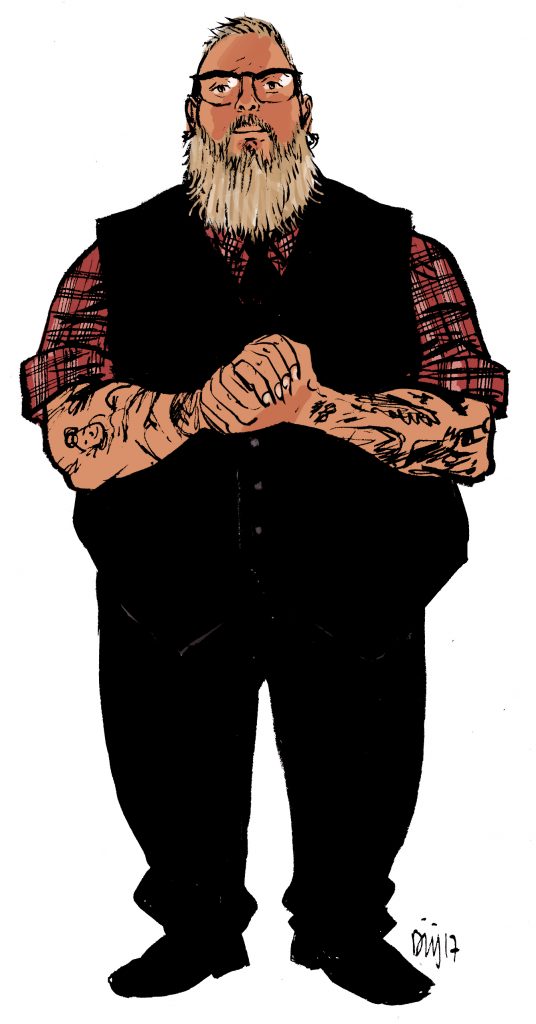
Hell yeah.
PB: That’ll be out and collected and we’ll have Jimmy Olsen and Plunge. And trying to cover different genres for people.
Dragon Hoops. Just sell Dragon Hoops. I love Dragon Hoops.
PB: Sure. I mean, which is great. I read that on slow days at Blue when that was the thing. I mean, so many retailers don’t make any money. We’re one of those retailers, but we still do this because we love comics. And what you were saying before about retailers that don’t like comics, I think that we don’t like the industry. We don’t like how hard it is to sell comics now. And this is a rough time for every industry. And I’m glad I’m not a concert promoter or a venue owner. I’m glad that my industry is still in a position to make money. We’re $80,000 down from this point last year, but we’re still here.
And a lot of places can’t say that. Yeah, we lost a store, but we plan on doing this for as long as we can and for as long as comics will have us. And yeah, I get frustrated over speculators and YouTube shows that make people think a book is worth something, when every book is priceless for the entertainment you get from it. None of these books that you’re buying now are going to be worth anything. Go back a year, look at the books that were this hot. Remember Wolverine’s daughter from Marvel comics presents? Remember when that was a big deal? That Charles Soule wrote from like two years ago or whatever.
Yeah. It was Marvel Comics Presents #5 or something like that?
PB: Yeah. Go look that up now. No one cares.
Yeah. That’s why they sell it really quickly.
PB: Donny Cates and James Tynion IV are, through no fault of their own, so frustrating right now because everybody wants to buy their books, but not to read them.
I mean, it is interesting though. So in Bosco’s in my shop, they have this sign out it’s like we know 2020, it’s been a weird year, but how did it become the ’90s again?
PB: I saw you post that. I laughed at that because they’re right.
I mean, they’re limiting how much people can buy because of that. And it is interesting. One of the things I actually wanted to ask you, is how things changed the most and how they changed the least over your time? And it is interesting because I feel like we’ve kind of circled back to that 1990 to 1995 range, where there’s a lot of speculation going on, except for it’s been like supercharged, because we have the internet and YouTube and all these different things.
PB: And that’s the weird thing. I don’t understand a lot of this because I’m not saying I’m an authority. I’m not saying the people at Bosco’s are the authority, but I would think that if you’ve been shopping with us for a while, you would take our opinion over someone on the internet you’ve never met. A lot of these people that are doing these shows, these YouTube channels or whatever, they’re just fans. Why is what they say any better than what somebody else says? And why does it mean more? And it’s like, when eBay first came around, it started ruining the pricing of books because it stopped being what a book is worth and it became what you can get for it.
So if you have this issue of Green Lantern that was traditionally $6 and somebody buys it for $200 because they don’t know any better, from now on that book is $200 book because someone paid that for it.
And that is not how value works. It shouldn’t be, but that’s what it is. And that is what is happening now. And the people that… We, like Boscos, for years, we’ve had a rule. We have this small sign at the register that, you are limited to two copies of any given book for the first week that it is out. Unless you are a subscriber, then you can pre order as many as you want before the orders go in. You can’t call up a Monday and say, “I’d like to sign up for Thor, can I have 100 copies of this week’s book?” No. If you want to order 100 copies of Thor every month, sure. We’ll give you a discount for it. But you have to tell us before our orders go in.
But people don’t want anything until it’s already out. Until the buzz is there, until the internet says what the “hot” books are going to be. And David, people in comics are so generous because they always have a friend who just can’t make it in and they just need another copy for their friend.
That’s very considerate.
PB: And this is one of my favorite things to do now, is we had a guy and he was trying to buy three copies of this week Thor. And Dal said, “No, I’m sorry. You can only get two.” He’s like, “Oh my buddy can’t make it in. I want to get one for him.” We’ll give him an extra. So I said, “You’re already buying two. Give him one of those.” Oh, he’s not that good of a friend huh. And then this guy immediately sends his wife back in, to buy two more copies, which fine that’s our rule. You got around it. We’ll take your cover price on these books. And honestly, this is the first issue of Thor where we’re like, let’s just order a whole bunch of extra for no reason and see what happens.
And we’re so glad we did.
I mean, of course the problem with that, is that person’s not coming back for Thor #7 when it’s about…
PB: Right. And that’s the hardest part because you look at your sales data and it’s meaningless. And it’s bad enough that we’re having all these problems trying to get DC subscriptions maintained, because it’s hard to order the DC books because the sales data isn’t accurately reflected, because the books aren’t imported through Diamond anymore. So even though you can log in and say, hey, we get this many copies of Batman, it doesn’t tag it to the ongoing subscription. So it skips the sales in the reporting. So you’re like shit, I have to go count how many I have on the shelf I guess, to figure out how many we need to order.
And I do most of our ordering late in the evening from home. I log into the computer from here, because it’s way more comfortable. And it’s very hard to keep the mindset going when you have to stop and ring people up, because you’re in a groove, you’re thinking about sell throughs. And then, I’m sorry. You know where we keep Smile? Sure, let me go show you. Come back what were they doing? What book was this? Alright. Then you have look at the numbers and go, oh Green Lantern. Okay. And then you get back into the rhythm of what to order.
So it’s too distracting to try to order while you’re on the sales floor, but it’s that computer as well. And then from Lunar, we use Lunar for DC now. You’re guessing. You’re just guessing. And it’s what we used to do. We used to do everything on graph paper and that would be easier now I think.
I was going to ask, instead of how have things changed the most or the least, is it easier or more difficult today than it was when you first started?
PB: Technology has made it easier. We’re not running things out of a cigar box or register. Technology helps you in theory, track sales and keep a record of what people want. And that helps it more. The different ways you can take payments, the way you can sell things online, the way people can just wave their phone over this little electronic box and get charged. All of that stuff is easier. It’s harder because of the sheer volume of product that’s available. It’s harder to keep up on everything and know where everything is. It’s harder to remember what people like, because there’s so much stuff.
It was easier back in the day because the market was so much smaller.
One of my favorite possessions is I have this book in front of me. It’s called So You Want To Be A Comics Retailer A Step by Step Guide On Ordering And Operating Successful And Profitable Comic Book Store. From RBM press written by a guy named Rick Boal published in 1995. Let me give you just a quick little hits here, which is so wonderful.
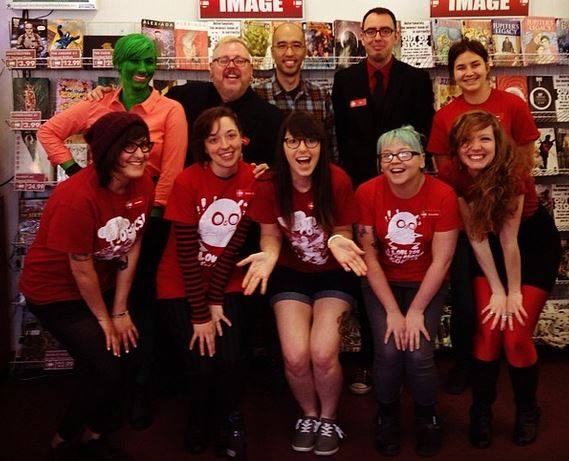
That was a New York times bestseller wasn’t it?
PB: It was off the charts. They had to stop reporting it because it just made everybody else feel bad about their sales.
Approximately 7,500 common retail stores are currently open in North America.
It’s like a third of that now?
PB: Yeah. “The best estimate from distributors and publishers, is that approximately 2,400 comic shops open and 1,800 close each year. The average store is 1,700 square feet of retailing space. Average gross profit margin, 37.5%.”
Wow. Just a couple more questions. Well, actually I just have to throw this out there. Your nephew’s name is Parker, right?
PB: Yes.
Does anything make you feel like you’ve aged more than how quickly he’s grown up? Because I remember back when you were talking about him being a kid and I was 18. What the hell?
PB: Wow. Yeah.
I’m sorry to make you feel aged, but this is a conversation about the fact that you’ve been in comics retail for 30 years.
PB: Yeah. I was in a store called Fat Dutchies’s Comics. We used to do tours of other stores just to see what other people are doing and what would work and what wouldn’t. And I got a call from my brother telling me that Parker was born and I was in Fat Dutchies’s Comic Shoppe in Palatine, Illinois when Parker was born. Yes.
That’s amazing.
PB: And obviously he’s named Parker for Peter Parker of course.
I want to close with some larger topics. We talked about how you weren’t necessarily the first, but there were a whole bunch of shops like Comix Experience, and Isotope, and you guys. But since then it seems like there’s a lot more shops that are a little bit more built on inclusivity, a little bit more focused on unlike the other bookstore type vibe, etc. While there aren’t 7,500 shops that are an average size of 1,700 square feet with a profit margin of 36% or whatever, do you think comic shops-
PB: I love that you recalled that immediately. You got all those right.
This is why I can write really long articles. For some reason my brain doesn’t forget things and I don’t know why. Anyways, but do you feel like comic shops today are better than when you started?
PB: Yes, hands down. Yes. I don’t want to say, Oh, look, everyone’s doing what we’re doing now. But a lot of stores are following a model that we have. And there’ll be times when I look at the industry and think, alright, so what’s the next step? What do we do to innovate from here? But change for the sake of change isn’t good or necessary. You only implement something when you have a better idea. All those things that we tried and don’t do anymore we thought it was a better idea. And you just move on. Just the idea of forcing yourself to do something new, just to do it new, that’s wrong. But I think that, 100%, the ability to make somebody feel like they’re included, like they belong is what comic store’s always needed and didn’t have for a very long time.
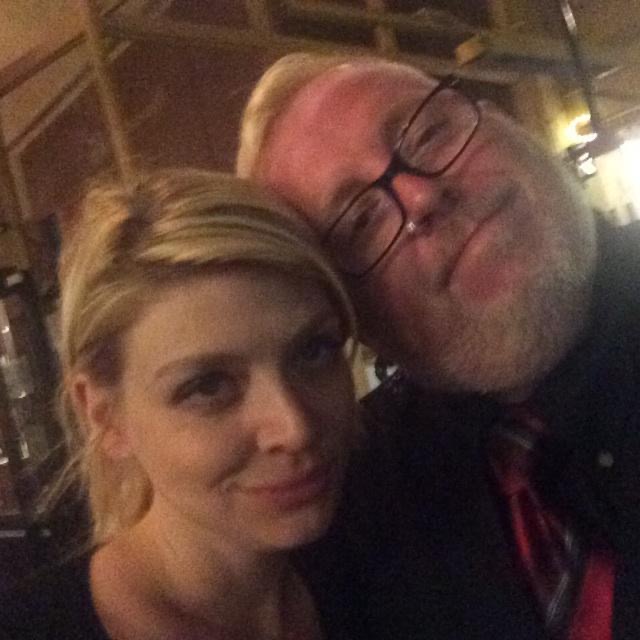
One of, this is going to be a quick story. But one of the absolute best things about working in comics for me is I got to be friends with Amber Benson. Amber played Tara from Buffy the Vampire Slayer, but she is a close friend of mine and one of the literal best humans on this planet. Recently, I don’t know, maybe last summer there was somebody in the store for the first time. And you say hi when people come in and if they’ll walk around and they look confused, you’re like, “Hey, can I help you find anything? Is there anything you’re looking for?” I don’t try to overdo it, but I want people to know that I’m here for questions, but I’m not going to bother you.
So this person had, they looked a little, not a little lost, but a little overwhelmed. And I’m like, “Hey, do you need help finding anything?” They said that they’re not usually comfortable in comic stores and they want to read comics, but they don’t know what they should read. And they don’t want to feel dumb for what they get.
I gave them the whole… “There’s no wrong answer.” Blah, blah, blah. “But let’s talk about what you do like.” And they said they’re a big fan of Buffy. I’m like, “Alright, well, this is a great time to be a Buffy fan because a company called BOOM! Studios just started publishing a new Buffy version, but it’s like she’s starting right now. It’s a brand new idea. The idea of Buffy is brand new in the world. Pretend you’d never read it before.” So I showed them the book and then they open up a little bit more about what Buffy meant to them. Specifically, they learned how to be comfortable being gay from that TV show and how the Tara character was one of their all-time favorites.
And then they said, “Oh my God, I can’t believe I’m telling you this. I never talked to anybody about this.” Then they got a little uncomfortable. I’m like, “Hey, don’t, I mean, I appreciate you sharing with me.” So they went back off to the small books. So I went back by the counter and I called Amber and said, “Hey, do you mind? Do you got a minute to talk to somebody?” And I gave her a quick rundown on what this is about. And she says, “Yeah, let’s do it.” She was literally on a train going to Colorado when I called, but she was like, “No, let’s do this.” So I walk over to the person and I say, “Hey, I’m really sorry. I didn’t get your name before.” And they said, “Oh, I’m Courtney.” I’m like, “Hey Courtney, my name is Patrick and this is Amber.”
I gave her the phone and Amber talked to her for five or six minutes or so. It just made that person’s day. To be able to talk to the person that made them feel comfortable about who they are. And I got to be part of that because of comics, because I work in comics, I got to meet Amber and I got to say, “Hey, can you do this for someone who’s a big fan of yours?” And she did. I don’t want to give myself any credit for that, but I just happened to be the puzzle piece that connected those two people. But that feeling stayed with me for a long time.
And that’s the power that comic shops can wield. I do think that it’s interesting because I know that comic shops get a bum rap sometimes. But I really do think that, especially with those 30 years, I can tell you, I’ve been to a lot of comic shops during my lifetime. And they have evolved dramatically. I go to a shop in any place I visit and I’ve done that my entire life. And I’ll tell you what, when I was a kid, besides Bosco’s because they knew me, even as a young, white guy, I never felt super welcome in most of the shops I went in there. It was just like, Oh, what’s this kid doing here?
But now I see people going to shops. I visit Austin Books and Comics, or I go to Books with Pictures in Portland, or I go to any number of other shops, Big Bang Comics in Dublin. Go to those shops and you find people who are happy to help you and have the ability to do so. And I’m not saying that that’s completely new, but I would say that the percentage of shops that make people feel totally welcome has increased. And I think that’s a really good thing.
PB: I think a lot of it is also due to the like-minded retailers who work at those stores. And I think that for as much as the internet is garbage for telling people what they should buy for the wrong reasons, it’s really great. And letting us, as retailers, stay in touch with each other. You had mentioned Big Bang. I think John and Bruno from Big Bang are two of the best retailers in the business. And I love being able to connect with them even though they’re in Ireland and I’m in Chicago. They’re inspiring. I know I’ve been doing this longer, but it’s people like them that make me think, yeah, we’re on the right path. And I want to be more like them. There are so many great retailers and I don’t want to leave anybody out. But Jermaine Exum from Acme and Ralph from Amazing Fantasy, we mentioned Joe Field before and Brian Hibbs and I can’t… I’ve got to stop naming people. There are so many great retailers that I’m proud to know. Jenn Haines from The Dragon, so great.
I just want to say Jermaine Exum is really funny to me because for a long time, I just thought he was a guy named Lord Retail. I was like, “Who is this Lord Retail person?” And then we actually talked. Lord Retail is really nice!
PB: Don’t actually say, “who’s Lord Retail?” because you might give them an existential crisis. Who is Lord Retail?
But my point is, I am still inspired to this day by so many of the great retailers who are selling comics now. And it doesn’t matter how long they’ve been doing this. I’ve been doing this for 30 years. I don’t feel like an industry veteran, I still feel like a new kid. I mean, my body doesn’t. I’m an older broken man, but I still feel young in this game. We’re at a point where Superman is as old as my dad. I think Carol Danvers debuted the same year I did as a character. So looking at these major properties that are created in our lifetime. Kids today growing up with Harry Potter always in their life. And people like me, Harry Potter didn’t exist for the first 30 years I was alive or what have you.
But when you can say… Spider-Man has been a part of the world for as long as these people have been there. That’s where it transcends. And Spider-Man is one of those characters that people will know forever. Infants know who Spider-Man is when their parents don’t even read comics and they don’t understand that. But they love him. They love Spider-Man.
We have a sign up in the store that says, “This pandemic is temporary, Spider-Man and Batman are forever.”
I love it. Well, I hate to put us in this direction to close because it was such a nice place we were. But you’ve been in comics for 30 years, comics retail for 30 years. And there’s always a lot of doom and gloom. I mean, honestly, it’s wild. You can look back to articles written in the 90’s that are doom and gloom about comics retail, all about comics and everything like that. I’m curious, as someone who’s been there for a long time, do you think that there’s always… Okay, let’s not say always. But do you think that there’s a place for comic shops in the future going forward?
PB: Yeah, I think, I definitely. Look at record stores. Record stores are more prevalent now than they have been in the last decade. I think that referencing record stores isn’t the way to go because they went away for a while.
There’s this really great two panels spread from Bad Weekend, from Criminal that Ed Brubaker just posted in his weekly email newsletter. But it’s a character saying, “I thought you said comics is dying.” “Comics have been dying since 1954, kid. Don’t let that stop you.”
Comics have always been dying and in trouble. I think that comic stores will exist for the rest of my lifetime, maybe not as many. There’s obviously right now… If we were having this conversation a year ago, my outlook would be a lot more positive and sure of the industry. It’s a little less so because of everything that’s happening right now.
Right. A lot of which is not in comics.
PB: Right. Definitely. There will always be comics for sure. But that’s not your question. Your question is, will there be comic stores. Yeah, I don’t think they’re going anywhere. I think they may evolve. I distinctly remember in the early 90’s we moved stores. We kept outgrowing the stores because business was so good. And one of the stores we moved into, the second store that I worked at, or that location, it was the same store. We just moved to the storefront next door. There was two rooms and they had knocked it down to make it one. But there was still a small arch in between the two rooms. So there was an overhang coming down from the ceiling. And I remember mounting a shelf up there because we needed a place to put these things called graphic novels. Because we had a couple of them, like Batman, Digital Justice, and Watchmen and some of these early Cerebus collection.
So we needed somewhere for those to go because they didn’t have their own space. And I specifically remember mounting the very first graphic novel shelf in my retail career. I remember being on the ladder and screwing it in, or hammering it in or whatever. I don’t remember that well, obviously. I don’t remember. If it was a hammer or a screw. I remember putting it up and people would have to reach up and take things down. But I was like, “Oh, we need a place for these to go.” And now imagine a comic shop without graphic novels.
No, it’s impossible.
PB: It’s impossible. And you couldn’t survive without them unless you had two dozen copies of Action Comics #1 that you could just sell repeatedly. That would probably work for you.
That would be pretty good. You should do that.
PB: Yeah. You know what, why haven’t I?
Well, is there anything that you’d like to leave us with?
PB: Just that comics are great, and I never thought I’d still be doing this after 30 years. I still love comics dearly. It’s harder than ever to sell comics, but that’s a facet of the world we live in and the turmoil in our industry. We’re repeating history, but that’s okay because we’ve been through it before. And if history taught us anything is that it keeps moving, and comics keep moving with it.
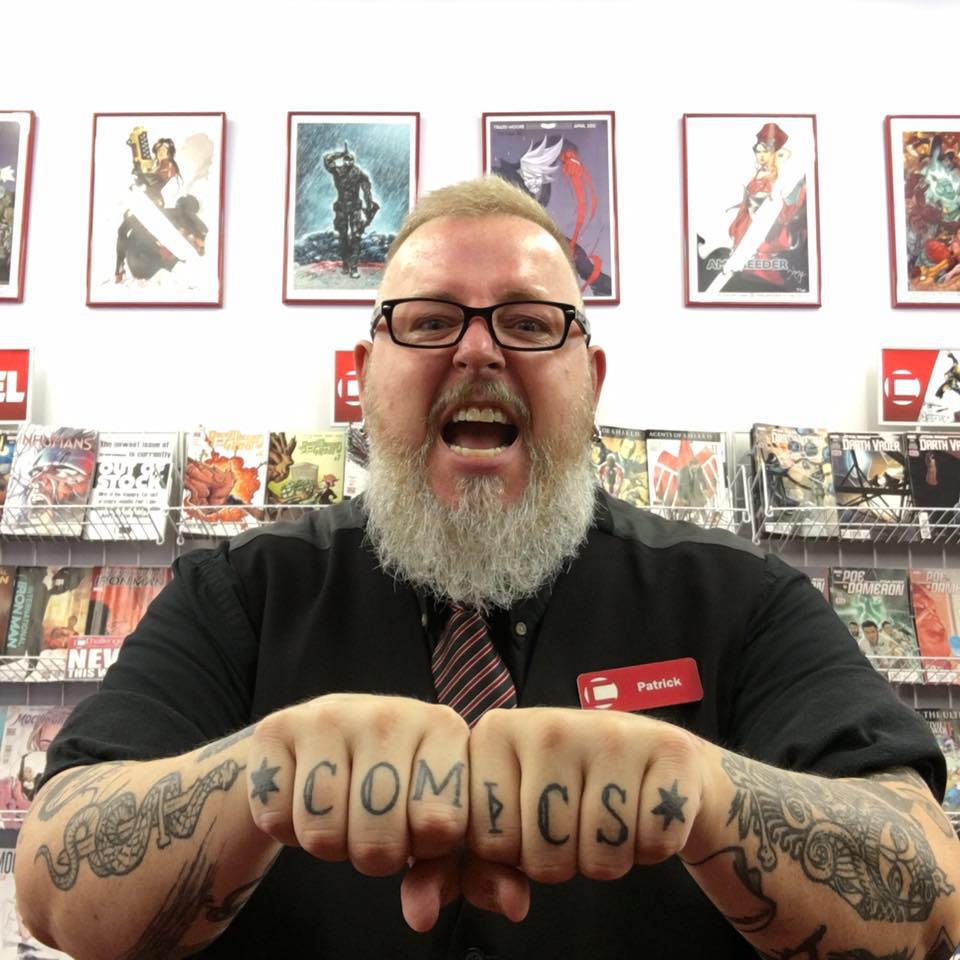
At this point, there’s a quick interlude talking about Magic cards, amongst other things.↩
